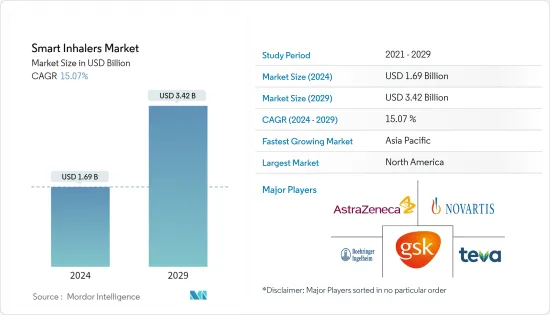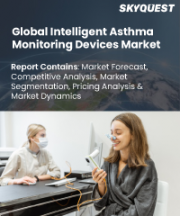
|
시장보고서
상품코드
1521875
스마트 흡입기 : 시장 점유율 분석, 산업 동향 및 통계, 성장 예측(2024-2029년)Smart Inhalers - Market Share Analysis, Industry Trends & Statistics, Growth Forecasts (2024 - 2029) |
||||||
스마트 흡입기(Smart Inhalers) 시장 규모는 2024년 16억 9,000만 달러로 추정 및 예측되며, 2029년 34억 2,000만 달러에 달할 것으로 예상되며, 시장 추정 및 예측기간(2024-2029년)의 CAGR은 15.07%로 추이하며 성장 할 것으로 예측됩니다.

팬데믹은 원격 의료 및 원격 환자 모니터링의 채택을 가속화했습니다. 팬데믹시 원격 의료 급증은 스마트 흡입기의 중요성을 증폭시켜 원격 환자 모니터링 및 데이터 수집을 용이하게 했습니다. 가상 의료 서비스에 대한 수요가 증가함에 따라 의료 제공이 진화하는 상황에 따라 원격 솔루션의 채택을 추진했습니다. 유행 기간 동안 호흡기 건강에 대한 관심이 높아짐에 따라 환자와 의료 제공업체는 흡입 요법의 충고의 중요성을 더욱 의식하게 되었습니다. 알림 기능을 갖춘 스마트 흡입기는 환자가 계속 복용하는 데 도움이되었습니다. 스마트 흡입기는 호흡기 질환의 효율적인 모니터링과 원격 관리를 가능하게 하고 유행 대책에 자원을 나누어 의료 시스템의 부담 경감에 기여했습니다. 전반적인 효과로서 특히 호흡기 질환 관리에 대한 스마트 흡입기 기술의 인식과 채택이 높아진 것으로 예상됩니다.
그러므로 팬데믹은 스마트 흡입기 시장 성장의 주요 요인으로 밝혀졌습니다. 이 업계는 호흡기 질환의 유병률 상승, 프로액티브하고 개별화된 의료의 중시 확대, 센서 기술 진보, 주류의 의료 행위에의 디지털 헬스 솔루션의 통합 증가 등을 원동력으로서, 큰 성장을 달성 할 것으로 예상됩니다.
또한 대기 오염 증가, 흡연 및 노화는 만성 호흡기 질환의 환자 수 증가에 기여합니다. 세계 194개국의 데이터별 최근 추정은 Global Initiative for Asthma Reports, 2020에 게재되어 매년 400만 명의 소아 천식의 신규 사례가 NO2 오염에 기인할 수 있으며, 세계 이환율의 13%를 차지한다고 결론 내리고 있습니다. 이 기여는 새로운 천식 사례의 20%를 초과합니다. 같은 논문에서 보고된 유럽의 분석 서브세트에서 서유럽에서는 17%, 중앙유럽에서는 14%, 동유럽에서는 17%의 부담이 NO2로 인한 것으로 추정되었습니다. 이 질병의 환자는 증상을 조절하고 악화를 방지하기 위해 효과적인 병리학 관리가 필요합니다. 흡입제는 이러한 질병의 치료의 주요 수단입니다.
또한, 복약 순응도 저하는 만성 호흡기 질환 관리에서 중요한 문제입니다. 2022년 미국 국립의학도서관에서 발표한 연구에 따르면, 복약 순응도가 낮고 흡입기를 잘못 사용하면 천식이 최선이 아닌 상태로 조절되는 것으로 나타났습니다. 복약 순응도는 전 세계적으로 13%에서 52%까지 다양합니다. 질병에 대한 인식, 약물에 대한 믿음, 건망증, 흡입기 사용법 이해의 어려움, 질병에 대한 태도, 자기 효능감 등 여러 요인이 복약 순응도 저하에 영향을 미칩니다. 많은 환자들이 처방된 흡입기 요법을 준수하는 데 어려움을 겪고 있으며, 이로 인해 최적의 질병 관리가 이루어지지 않습니다. 스마트 흡입기는 알림, 복용량 추적, 의료진과의 데이터 공유와 같은 기능을 제공합니다. 이러한 기능은 환자의 흡입기 요법 순응도를 크게 향상시키는 것으로 입증되었습니다. 네덜란드 흐로닝언 천식 및 만성 폐쇄성 폐질환 연구소(GRIAC)에서 실시한 연구에 따르면 스마트 흡입기는 자가 관리 가이드를 제공함으로써 의료 전문가에게 도움이 된다는 결론을 내렸습니다. 또한 여러 연구에 따르면 전자 흡입기 리마인더가 표준 치료에 비해 복약 순응도를 크게 높인다는 사실이 밝혀졌습니다. 이는 입원, 응급실 방문 및 관련 의료 비용의 감소로 이어져 환자와 의료 시스템 모두에게 이익이 됩니다.
Teva의 프로에어 디지 헬러는 센서가 내장된 최초의 디지털 흡입기로 원격 모니터링 및 치료 계획을 조정할 수 있습니다. 이것은 COVID-19 팬데믹 시 특히 중요해졌으며 이후 표준 치료가 되었습니다. 스마트 흡입기는 환자가 자신의 상태를 적극적으로 관리할 수 있는 도구를 제공함으로써 환자에게 힘을 줍니다. 흡입기의 사용 상황과 증상을 추적하는 기능은 환자 자신의 관리에 대한 참여를 향상시킵니다.
그러므로 스마트 흡입기에 대한 수요가 증가함에 따라 이 부문의 혁신을 추진하고 있으며, 더 많은 기업들이 R&D에 투자하고 있어 스마트 흡입기의 선택이 확대되고 있습니다. 그러나 대체품으로서 기존 흡입기의 이용 가능성, 엄격한 규제 요건, 컴플라이언스 기준 등 과제는 스마트 흡입기 시장의 혁신과 급속한 확대를 방해할 수 있습니다. 또한, 이러한 첨단 기기와 관련된 높은 비용으로 인한 환자의 잠재적인 경제적 부담은 특히 의료 자원이 제한된 지역에서 접근성을 제한하고 제약을 줄 수 있습니다.
스마트 흡입기 시장 동향
예측 기간 동안 정량 흡입기(MDI) 부문이 스마트 흡입기 시장을 독점할 전망
MDI는 정확하게 계량된 스프레이 또는 미스트로 약물을 전달하는 흡입 장치입니다. MDI는 추진제에 의해 추진되며 환자는 호흡과 흡입기의 작동을 조정해야합니다. 대부분의 경우 MDI는 친숙하고 사용하기 쉽기 때문에 선호됩니다. 많은 제약 회사와 흡입기 제조업체가 MDI에 스마트 기능을 통합하고 있으며, 복약 준수와 질병 관리를 강화하고 싶은 환자에게 매력적인 선택이 되고 있습니다. 예를 들어, 아스트라젠카의 심비코트 흡입기에는 복용량 추적성을 높이기 위해 사용량을 추적하고 환자에게 피드백을 제공하는 흡입기 분석 기능이 내장되어 있습니다.
MDI 기반 스마트 흡입기의 지속적인 기술 진보와 제품 승인은 시장을 더욱 추진할 것으로 예측됩니다. 용량 카운터, 흡입기 분석, 모바일 앱과의 통합과 같은 기술적 이점은 스마트 흡입기 시장에서 MDI의 이점에 기여합니다. 예를 들어, 2022년 2월 HeroTracker Sense는 COVID-19에 의한 만성 호흡기 질환 환자의 삶을 개선하기 위해 고안되었습니다. 이것은 MDI의 사용 상황을 추적하고 처방된 치료법 준수 향상을 촉진하는 것입니다.
따라서 MDI 기반 스마트 흡입기 부문은 환자 중심 의료에 중점을 두고 흡입기 효능을 높이는 기술 진보, 호흡기 관리에 디지털 건강 솔루션 통합 등 제품 승인 증가 등 주요 요인에 따라 예측 기간 동안 지배적일 것으로 예상됩니다. 이러한 요인은 스마트 흡입기의 역동적인 전망에서 MDI가 유망한 궤도를 그릴 것으로 예상되는 점을 뒷받침합니다.
북미가 스마트 흡입기 시장을 독점할 전망
북미는 호흡기 질환의 높은 유병률, 첨단기술의 급속한 성장, 이 지역의 견고한 의료 인프라 등 요인에 의해 시장을 독점할 것으로 예상됩니다.
북미에서는 천식과 COPD와 같은 호흡기 질환의 유병률이 높습니다. Asthma and Allergy Foundation of America에 따르면 2023년에는 미국에서 2,700만 명 이상이 천식을 앓고 있으며, 이는 약 12명 중 1명에 해당합니다. 또한 이 자료에 따르면 18세 이상의 미국 성인 천식 환자 수는 2,200만 명을 넘고 있습니다. 또한 미국 질병 예방관리센터(CDC)에 따르면 2001-2020년에 걸쳐 소아 천식 환자는 감소하고 있습니다. 그러나 소아의 50%가 통제할 수 없는 천식을 가지고 있는 것으로 추정됩니다.
북미 기업과 연구 기관은 스마트 흡입기 기술 개발의 최전선에 있습니다. 주요 제품 출시와 미국 시장 진출기업의 집중은 이 나라의 스마트 흡입기 시장의 성장을 가속하는 요인의 일부입니다. 예를 들어 미국의 Propeller Health는 천식과 COPD 관리를 위한 스마트 흡입기와 센서를 갖춘 플랫폼을 개발했습니다. 미국 식품의약국(FDA)은 스마트 흡입기 장치의 규제에 적극적으로 참여하고 있습니다. 2021년 캐나다의 연결된 호흡기 건강 기업인 BreatheSuite Inc.는 BreatheSuite 정량 흡입기(MDI) V1 장치에 대해 미국 FDA로부터 510(K) 인증을 받았습니다.
따라서 앞서 언급한 요인들에 의해 조사된 시장은 북미에서 성장할 것으로 예상됩니다.
스마트 흡입기 산업 개요
스마트 흡입기 시장은 세계 및 지역적으로 활동하는 여러 기업의 존재에 따라 세분화되었습니다. 경쟁 구도에는 시장 점유율이 있으며 잘 알려진 여러 국제 기업 및 지역 기업의 분석이 포함됩니다. 주요 기업은 Teva Pharmaceutical Industries Ltd, AstraZeneca, GlaxoSmithKline PLC, Novartis AG, ResMed, Adherium, AptarGroup Inc., Findair Sp. z oo, Boehringer Ingelheim International GmbH, Philip Morris International Inc. Vectura Group PLC Labs 등입니다.
기타 혜택 :
- 엑셀 형식 시장 예측(ME) 시트
- 3개월간의 애널리스트 서포트
목차
제1장 서론
- 조사 전제 조건 및 시장 정의
- 조사 범위
제2장 조사 방법
제3장 주요 요약
제4장 시장 역학
- 시장 개요
- 시장 성장 촉진요인
- 호흡기 질환의 유병률 증가
- 원격 의료와 원격 환자 모니터링에 의한 기술 진보
- 복약 준수의 향상
- 시장 성장 억제요인
- 대체품으로서 기존 흡입기의 이용가능성
- 이러한 첨단 장치와 관련된 높은 비용
- Porter's Five Forces 분석
- 신규 참가업체의 위협
- 구매자/소비자의 협상력
- 공급기업의 협상력
- 대체품의 위협
- 경쟁 기업간 경쟁 관계의 강도
제5장 시장 세분화(시장 규모-달러)
- 제품 유형별
- 건조 분말 흡입기(DPI)
- 정량 분무식 흡입기(MDI)
- 적응증별
- 천식
- 만성 폐색성 폐질환(COPD)
- 기타
- 유통 채널별
- 병원 약국
- 소매 약국
- 전자상거래
- 지역별
- 북미
- 미국
- 캐나다
- 멕시코
- 유럽
- 독일
- 영국
- 프랑스
- 이탈리아
- 스페인
- 기타 유럽
- 아시아 태평양
- 중국
- 일본
- 인도
- 호주
- 한국
- 기타 아시아 태평양
- 중동 및 아프리카
- GCC 국가
- 남아프리카
- 기타 중동 및 아프리카
- 남미
- 브라질
- 아르헨티나
- 기타 남미
- 북미
제6장 경쟁 구도
- 기업 프로파일
- Teva Pharmaceutical Industries Ltd
- AstraZeneca
- GlaxoSmithKline PLC
- Novartis AG
- ResMed
- Adherium
- AptarGroup Inc.
- Findair Sp. z oo
- Boehringer Ingelheim International GmbH
- Philip Morris International Inc.(Vectura Group PLC)
- BreatheSuite Inc.
- Cognita Labs
제7장 시장 기회 및 향후 동향
LYJThe Smart Inhalers Market size is estimated at USD 1.69 billion in 2024, and is expected to reach USD 3.42 billion by 2029, growing at a CAGR of 15.07% during the forecast period (2024-2029).

The pandemic accelerated the adoption of telehealth and remote patient monitoring. The surge in telemedicine during the pandemic amplified the significance of smart inhalers, facilitating remote patient monitoring and data collection. The increased demand for virtual healthcare services drove the adoption of remote solutions, aligning with the evolving landscape of healthcare delivery. With the increased focus on respiratory health during the pandemic, patients and healthcare providers became more conscious of the importance of adherence to inhaler regimens. Smart inhalers with reminder features helped patients stay on track. Smart inhalers helped reduce the burden on healthcare systems by enabling efficient monitoring and management of respiratory conditions remotely, freeing up resources to combat the pandemic. The overall effect was likely an increased awareness and adoption of smart inhaler technologies, especially for the management of respiratory conditions.
Therefore, the pandemic turned out to be a leading factor in the growth of the smart inhalers market. The industry is poised for significant growth, driven by an escalating prevalence of respiratory conditions, a growing emphasis on proactive and personalized healthcare, advancements in sensor technologies, and the increasing integration of digital health solutions into mainstream medical practices.
Furthermore, increasing air pollution, smoking, and the aging population contribute to a growing number of individuals affected by chronic respiratory disorders. A recent estimation based on data from 194 countries, published in the Global Initiative for Asthma Reports, 2020, concluded that each year, 4.0 million new cases of pediatric asthma might be attributable to NO2 pollution, accounting for 13% of global incidence. This contribution exceeded 20% of new asthma cases. The European analysis subset reported in the same paper estimated that 17% of the burden in Western Europe, 14% in Central Europe, and 17% in Eastern Europe was attributable to NO2. Patients with these diseases require effective management of their conditions to control symptoms and prevent exacerbations. Inhalers are a primary means of treatment for these conditions.
In addition, poor medication adherence is a significant issue in the management of chronic respiratory disorders. According to a study published by the National Library of Medicine in 2022, poor medication adherence and incorrect inhaler use lead to suboptimal asthma control. Medication adherence varies from 13% to 52% across the world. Several factors, such as illness perceptions, medication beliefs, forgetfulness, difficulty understanding inhaler techniques, attitude toward the illness, and self-efficacy, contribute to poor medication adherence. Many patients struggle to adhere to prescribed inhaler regimens, leading to suboptimal disease control. Smart inhalers offer features like reminders, dose tracking, and data sharing with healthcare providers. These features have been proven to significantly improve patient adherence to inhaler regimens. A research study conducted at the Groningen Research Institute for Asthma and COPD (GRIAC) in the Netherlands concluded that smart inhalers help healthcare professionals by providing guided self-management. It was also stated that several studies have found that electronic inhaler reminders significantly increase medication adherence compared to standard care. This leads to a reduction in hospitalizations, emergency room visits, and associated healthcare costs, benefiting both patients and healthcare systems.
Teva's ProAir Digihaler is the first digital inhaler with built-in sensors, which allows for remote monitoring and adjustment of treatment plans. This became especially important during the COVID-19 pandemic and has since become a standard of care. Smart inhalers empower patients by providing them with tools to manage their condition actively. The ability to track their inhaler usage and symptoms enhances patient engagement in their own care.
Therefore, the increasing demand for smart inhalers has driven innovation in the field, and more companies are investing in research and development, resulting in a wider range of smart inhaler options. However, challenges such as the availability of traditional inhalers as a substitute, stringent regulatory requirements, and compliance standards could impede innovation and rapid expansion of the smart inhalers market. In addition, the potential financial burden on patients, stemming from the higher costs associated with these advanced devices, may pose a restraint, limiting their accessibility, particularly in regions with limited healthcare resources.
Smart Inhalers Market Trends
The Metered Dosage Inhalers (MDI) Segment is Expected to Dominate the Smart Inhalers Market During the Forecast Period
MDIs are inhalation devices that deliver medication in a precisely measured spray or mist. They are propelled by a propellant, and patients should coordinate their breath with inhaler actuation. In most cases, MDIs are preferred due to their familiarity and ease of use. Many pharmaceutical companies and inhaler manufacturers are integrating smart features into MDIs, making them attractive options for patients who are looking to enhance medication adherence and disease management. For instance, AstraZenca's Symbicort Inhaler incorporates inhaler analytics to track usage and provide feedback to patients in order to enhance medication adherence.
Ongoing technological advancements and product approvals for MDI-based smart inhalers are further projected to propel the market. Technological benefits, such as dose counters, inhaler analytics, and integration with mobile apps, contribute to MDIs' dominance in the smart inhalers market. For instance, in February 2022, HeroTracker Sense was designed to improve the lives of patients with chronic respiratory disease caused by COVID-19. It helped track their MDI usage and facilitate improved adherence to their prescribed therapy.
Therefore, the MDI-based smart inhalers segment is expected to dominate over the forecast period due to major factors such as the growing emphasis on patient-centric healthcare, technological advancements enhancing inhaler effectiveness, and rising product approvals involving the integration of digital health solutions into respiratory care. These drivers collectively underscore the promising trajectory of MDIs within the dynamic landscape of smart inhalers.
North America is Expected to Dominate the Smart Inhalers Market
North America is expected to dominate the market owing to factors such as the high prevalence of respiratory diseases, rapid growth in advanced technologies, and robust healthcare infrastructure in the region.
The prevalence of respiratory diseases, such as asthma and COPD, is substantial in North America. As per the Asthma and Allergy Foundation of America, in 2023, more than 27 million people in the United States had asthma, equaling about 1 in 12 people. Moreover, as per the same source, more than 22 million United States adults aged 18 and older had asthma. Furthermore, according to the Centers for Disease Control and Prevention (CDC), cases of asthma in children have declined from 2001 through 2020. However, it was estimated that 50% of children had uncontrolled asthma.
North American companies and research institutions have been at the forefront of developing smart inhaler technology. Key product launches and the high concentration of market players in the United States are some of the factors driving the growth of the smart inhalers market in the country. For example, Propeller Health, a US-based firm, developed a platform with smart inhalers and sensors for asthma and COPD management. The US Food and Drug Administration (FDA) has been actively involved in regulating smart inhaler devices. In 2021, BreatheSuite Inc., a connected respiratory health company in Canada, received the 510(K) clearance from the US FDA for its BreatheSuite metered-dose inhaler (MDI) V1 device.
Therefore, owing to the aforesaid factors, the market studied is anticipated to witness growth in North America.
Smart Inhalers Industry Overview
The smart inhalers market is fragmented due to the presence of several companies operating globally and regionally. The competitive landscape includes an analysis of a few international and local companies that hold market shares and are well known. The key players include Teva Pharmaceutical Industries Ltd, AstraZeneca, GlaxoSmithKline PLC, Novartis AG, ResMed, Adherium, AptarGroup Inc., Findair Sp. z o. o., Boehringer Ingelheim International GmbH, Philip Morris International Inc. (Vectura Group PLC), BreatheSuite Inc., and Cognita Labs.
Additional Benefits:
- The market estimate (ME) sheet in Excel format
- 3 months of analyst support
TABLE OF CONTENTS
1 INTRODUCTION
- 1.1 Study Assumptions and Market Definition
- 1.2 Scope of the Study
2 RESEARCH METHODOLOGY
3 EXECUTIVE SUMMARY
4 MARKET DYNAMICS
- 4.1 Market Overview
- 4.2 Market Drivers
- 4.2.1 Growing Prevalence of Respiratory Diseases
- 4.2.2 Technological Advancements Owing to Telehealth and Remote Patient Monitoring
- 4.2.3 Improved Medication Adherence
- 4.3 Market Restraints
- 4.3.1 Availability of Traditional Inhalers as a Substitute
- 4.3.2 High Cost Associated with These Advanced Devices
- 4.4 Porter's Five Forces Analysis
- 4.4.1 Threat of New Entrants
- 4.4.2 Bargaining Power of Buyers/Consumers
- 4.4.3 Bargaining Power of Suppliers
- 4.4.4 Threat of Substitute Products
- 4.4.5 Intensity of Competitive Rivalry
5 MARKET SEGMENTATION (Market Size by Value - USD)
- 5.1 By Product Type
- 5.1.1 Dry Powder Inhalers (DPI)
- 5.1.2 Metered Dosage Inhalers (MDI)
- 5.2 By Indication
- 5.2.1 Asthma
- 5.2.2 Chronic Obstructive Pulmonary Disorders (COPD)
- 5.2.3 Others
- 5.3 By Distribution Channel
- 5.3.1 Hospital Pharmacies
- 5.3.2 Retail Pharmacies
- 5.3.3 E-commerce
- 5.4 Geography
- 5.4.1 North America
- 5.4.1.1 United States
- 5.4.1.2 Canada
- 5.4.1.3 Mexico
- 5.4.2 Europe
- 5.4.2.1 Germany
- 5.4.2.2 United Kingdom
- 5.4.2.3 France
- 5.4.2.4 Italy
- 5.4.2.5 Spain
- 5.4.2.6 Rest of Europe
- 5.4.3 Asia-Pacific
- 5.4.3.1 China
- 5.4.3.2 Japan
- 5.4.3.3 India
- 5.4.3.4 Australia
- 5.4.3.5 South Korea
- 5.4.3.6 Rest of Asia-Pacific
- 5.4.4 Middle East and Africa
- 5.4.4.1 GCC
- 5.4.4.2 South Africa
- 5.4.4.3 Rest of Middle East and Africa
- 5.4.5 South America
- 5.4.5.1 Brazil
- 5.4.5.2 Argentina
- 5.4.5.3 Rest of South America
- 5.4.1 North America
6 COMPETITIVE LANDSCAPE
- 6.1 Company Profiles
- 6.1.1 Teva Pharmaceutical Industries Ltd
- 6.1.2 AstraZeneca
- 6.1.3 GlaxoSmithKline PLC
- 6.1.4 Novartis AG
- 6.1.5 ResMed
- 6.1.6 Adherium
- 6.1.7 AptarGroup Inc.
- 6.1.8 Findair Sp. z o. o.
- 6.1.9 Boehringer Ingelheim International GmbH
- 6.1.10 Philip Morris International Inc. (Vectura Group PLC)
- 6.1.11 BreatheSuite Inc.
- 6.1.12 Cognita Labs

















